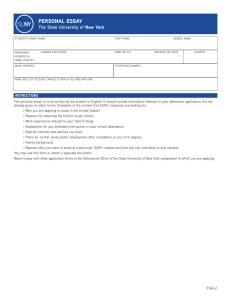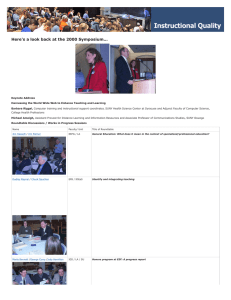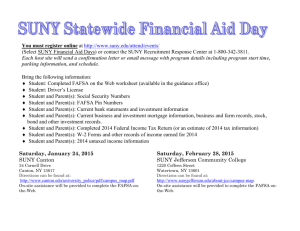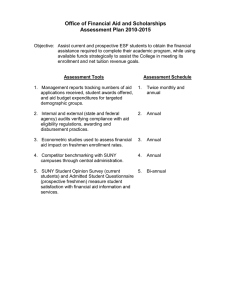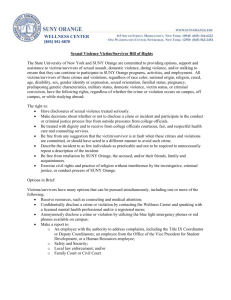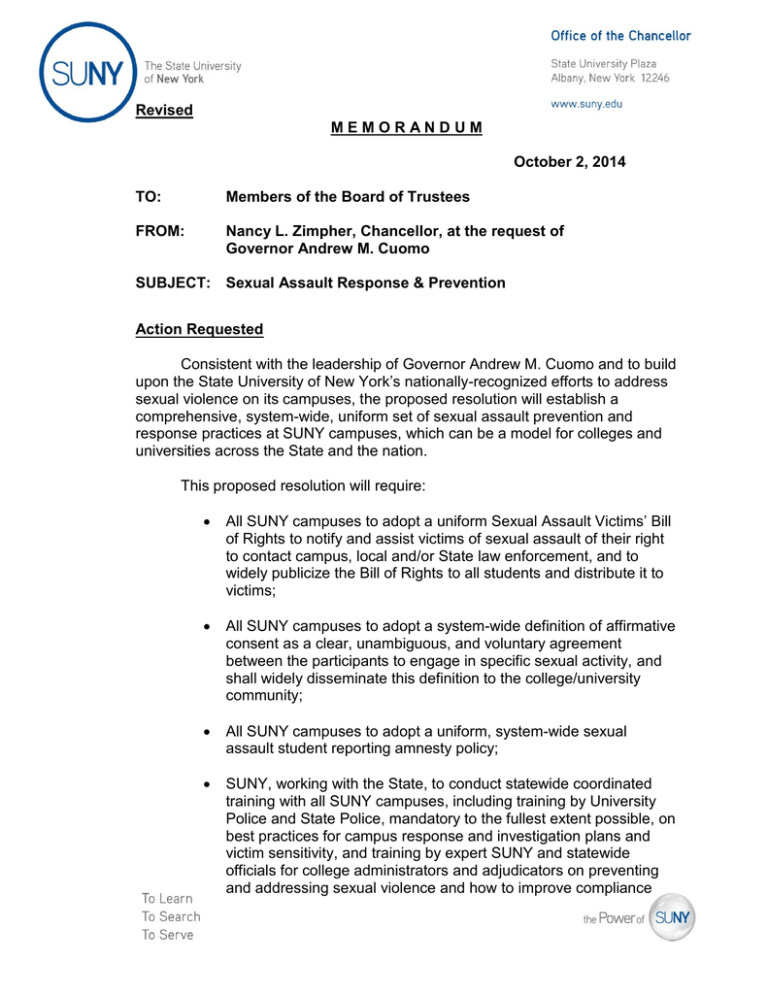
Board Resolution
-1-
Month, Day, Year
Revised
MEMORANDUM
October 2, 2014
TO:
Members of the Board of Trustees
FROM:
Nancy L. Zimpher, Chancellor, at the request of
Governor Andrew M. Cuomo
SUBJECT: Sexual Assault Response & Prevention
Action Requested
Consistent with the leadership of Governor Andrew M. Cuomo and to build
upon the State University of New York’s nationally-recognized efforts to address
sexual violence on its campuses, the proposed resolution will establish a
comprehensive, system-wide, uniform set of sexual assault prevention and
response practices at SUNY campuses, which can be a model for colleges and
universities across the State and the nation.
This proposed resolution will require:
All SUNY campuses to adopt a uniform Sexual Assault Victims’ Bill
of Rights to notify and assist victims of sexual assault of their right
to contact campus, local and/or State law enforcement, and to
widely publicize the Bill of Rights to all students and distribute it to
victims;
All SUNY campuses to adopt a system-wide definition of affirmative
consent as a clear, unambiguous, and voluntary agreement
between the participants to engage in specific sexual activity, and
shall widely disseminate this definition to the college/university
community;
All SUNY campuses to adopt a uniform, system-wide sexual
assault student reporting amnesty policy;
SUNY, working with the State, to conduct statewide coordinated
training with all SUNY campuses, including training by University
Police and State Police, mandatory to the fullest extent possible, on
best practices for campus response and investigation plans and
victim sensitivity, and training by expert SUNY and statewide
officials for college administrators and adjudicators on preventing
and addressing sexual violence and how to improve compliance
Board Resolution
-2-
October 2, 2014
with existing federal laws. SUNY will also release a uniform training
for students to be included at each freshman orientation;
SUNY, in coordination with the State, to undertake a statewide
public awareness campaign, to increase awareness among college
students, high school students, and parents of individual safety and
prevention techniques as well as the importance of bystander
intervention in any unsafe situation;
All SUNY campuses to adopt a uniform, system-wide
Confidentiality and Reporting Protocol; and
All SUNY campuses to conduct a uniform campus climate
assessment.
Resolution
I recommend that the Board of Trustees adopt the following resolution:
Whereas sexual assault and violence on campuses cause
unmeasurable trauma to victims and cannot and will not be
tolerated; and
Whereas New York State and SUNY are committed to taking
great care in protecting the safety and well-being of all of its
students, employees and personnel and to creating and
maintaining a safe educational and learning environment
free from all sexually related harms, whether occurring on or
off campus; and
Whereas SUNY recognizes the need to take all possible
precautionary steps to prevent sexual assaults from
occurring, and finds that college/university officials can play
a crucial role in combatting sexually-related crimes that
injure our dedicated students and employees, and finds that
we must do everything possible to assist and safeguard the
victims of these horrendous crimes and to hold offenders
accountable for their actions in accordance with due
process;
and
Whereas Governor Andrew M. Cuomo has taken an active
leadership role in addressing sexual violence on
college/university campuses; and
Whereas consistent with the Governor’s leadership, SUNY
has done a comprehensive review of existing policies and
procedures, and recognizes that many of its campuses have
Board Resolution
-3-
October 2, 2014
long maintained programs that are best practices aimed at
responding to and preventing sexual assault and other forms
of sexual violence on and off campus, and finds that it is
critical that these best practices be replicated consistently at
all SUNY campuses so that there is a clear and uniform
policy system-wide; now, therefore be it
Resolved that all SUNY campuses shall adopt the systemwide, uniform Sexual Assault Victims’ Bill of Rights, to notify
and assist victims of sexual assault of their right to contact
campus, local, and/or State law enforcement; and, be it
further
Resolved that the Sexual Assault Victims’ Bill of Rights shall
include campus-specific and local community victim
resources, and shall be widely publicized to all students, with
a hard copy document being made specifically available to
any known victim, so that students have clear and effective
information on what rights and options they have as well as
how to access immediate and on-going assistance after an
act of sexual assault has occurred; and, be it further
Resolved that all SUNY campuses shall adopt the following
uniform definition of affirmative consent, and widely
disseminate this definition to the college/university
community:
Consent is clear, knowing and voluntary. Consent is
active, not passive. Silence, in and of itself, cannot be
interpreted as consent. Consent can be given by
words or actions, as long as those words or actions
create mutually understandable clear permission
regarding willingness to engage in (and the conditions
of) sexual activity.
Consent to any one form of sexual activity cannot
automatically imply consent to any other forms of
sexual activity.
Previous relationships or prior consent cannot imply
consent to future sexual acts.
A person is deemed incapable of consenting when
that person is mentally defective, mentally
incapacitated, physically helpless (whether induced
by drugs, alcohol or otherwise), or asleep; and, be it
further
Board Resolution
-4-
October 2, 2014
Resolved that all SUNY campuses shall adopt the uniform
sexual assault student reporting amnesty policy granting
amnesty for various student code of conduct violations, for
example, minor alcohol or drug infractions, for students
reporting incidents of sexual assault or other sexual
violence; and, be it further
Resolved that SUNY will work with the State to convene
statewide coordinated training by University Police and State
Police, mandatory to the fullest extent possible, on best
practices for campus response and investigation plans and
victim sensitivity, as well as training by expert SUNY and
statewide officials for college administrators and adjudicators
throughout New York State on preventing and addressing
sexual violence and how to improve compliance with existing
federal laws at a time to be announced by SUNY, and all
SUNY campuses shall implement the uniform freshman
orientation training; and, be it further
Resolved that SUNY will coordinate with the State to
undertake a statewide public awareness campaign to
increase awareness among college students, high school
students, and parents of individual safety and prevention
techniques as well as the importance of bystander
intervention in any unsafe situation; and, be it further
Resolved that all SUNY campuses shall adopt the uniform
Confidentiality and Reporting Protocol, encouraging the
prompt and accurate reporting of acts of sexual assault,
allowing the campus community to respond quickly to
allegations of sexual assault, and ensuring that students
have timely and accurate information about available
confidential resources; and, be it further
Resolved that all SUNY campuses shall conduct the uniform
campus climate assessment in order to gauge the
prevalence of sexual assault on campus, test students’
attitudes and awareness of the issue, and provide campuses
with information to help them form solutions for addressing
and preventing sexual assault on and off campus; and, be it
further
Resolved that, in consultation with the SUNY State-operated
campuses and community colleges, within sixty (60) days,
the Chancellor, or designee, shall adopt a comprehensive,
uniform, system-wide sexual assault prevention and
response plan to be implemented at all SUNY campuses
Board Resolution
-5-
October 2, 2014
that will include the following: (1) the uniform Sexual Assault
Victims’ Bill of Rights; (2) the uniform sexual assault student
reporting amnesty policy; (3) the uniform freshman
orientation training; (4) the uniform Confidentiality and
Reporting Protocol; (5) the uniform campus climate
assessment; and (6) the uniform definition of affirmative
consent; and, be it further
Resolved that all SUNY campus Presidents must report to
the Chancellor, or designee, by March 31, 2015, the actions
they have taken to address the measures set forth above,
and the Chancellor shall subsequently report to the Board on
the consolidated actions of the campuses and that the
Chancellor shall also report these actions to the Governor.
Attachment
Background on SUNY’s Sexual Violence Prevention Programming
A Mission of Fighting Sexual Violence and Helping Survivors:
•
•
•
•
•
The State University of New York takes the issues of sex discrimination,
including sexual violence, extremely seriously. SUNY is regarded as a leader in
fighting sex discrimination, including sexual violence, and providing resources to
victims and survivors.
SUNY partners with national, state and local organizations, as well as colleges
and universities across the country, to advance our mission of ending violence on
campus.
SUNY brings these issues to the forefront, discussing the problem of sexual
assault on campus at recent meetings of Presidents and Provosts, including a
panel of attorneys and Presidents. The Chancellor emphasized the importance
of fighting violence in all of its forms, including sexual violence. At a meeting of
the SUNY Board of Trustees, SUNY attorneys briefed Board members on these
critical issues and what SUNY is doing to lead.
SUNY offers training at many meetings of its professional employees.
Professionals from across our campuses, including HR professionals, police
chiefs, counseling center leadership, housing, judicial/conduct, and student
affairs leadership, meet with colleagues in similar positions at other SUNY
campuses on a regular basis throughout the year. At these meetings they receive
relevant updates and training from the Office of General Counsel and other
offices, which include emphasis and guidance on properly, promptly, and
impartially addressing complaints of sex discrimination, including sexual
violence.
SUNY campuses have wide-ranging programs that seek to prevent sexual
violence and address such violence when it occurs. Many of these programs
have been cited as national models, including citation in resources made
available by the White House Task Force to Protect Students from Sexual
Assault.
Training:
•
Over the past few years Office of General Counsel attorneys Joseph Storch and
Andrea Stagg have offered over 100 trainings to SUNY professionals on campus
safety issues, including Clery Act compliance, Title IX, the Violence Against
Women Act, Anonymous defamation and Cyber-Bullying, behavioral intervention
and threat assessment, bystander intervention, workplace violence prevention,
and related topics. Trainings are offered regionally to ensure participation across
all campuses. The two have also presented Webinars for national higher
education groups and have spoken at conferences and colleges across the
country. They have each trained over 5,000 higher education professionals
representing hundreds of institutions across the country, including training or
answering questions for lawyers and college officials from every state in the
Nation.
•
•
•
•
•
Last year, the Office of General Counsel issued guidance
(http://www.nacua.org/documents/VAWASummary.pdf) on complying with VAWA
prior to the President signing the bill. The guidance was issued to the SUNY
Clery and Title IX ListServs (each with around 300 members) and adopted by
several national higher education groups. SUNY’s Title IX and Clery ListServs
are the main vehicle for providing briefings and analysis on new guidance, law,
and regulation. A few weeks later, Stagg and Storch presented a group of
national Webinars to brief higher education professionals across the country on
the laws and changes we must make. Several thousand attended these
Webinars.
This year, the Department of Education issued proposed regulations
implementing the VAWA on June 19. On June 26, the Offices of General
Counsel, University Police and University Life (in partnership with the New York
State Office for the Prevention of Domestic Violence) conducted a training in
Albany for dozens of SUNY professionals on how to comply with the law this year
(not next year when the regulations actually take effect). A second training was
held July 9.
Between June 26 and July 9, over 250 SUNY professionals, representing 100%
of our State-operated colleges and nearly all SUNY community colleges,
attended the training and began working on implementing policies and trainings.
All campuses now have access to the tools, including knowledge as well as
sample documents, to best serve our students and comply with the law.
The team, including eight SUNY lawyers and two interns, wrote a 93 page
guidance document to accompany the training. These documents were written in
one week, between the regulations being published and the first training.
Following upon the trainings, SUNY made the guidance free and public, provided
no one used it for commercial purposes. The guidance was shared by several
national higher education groups and has been accessed over 15,000 times by
institutions across the country. http://system.suny.edu/media/suny/contentassets/documents/generalcounsel/SUNY-VAWA-Guidance-2014.pdf
White House Task Force:
•
•
•
•
SUNY campuses were recognized and cited by the CDC in the White House
Report for their evidence-based strategies for primary prevention of sexual
violence. https://www.notalone.gov/assets/evidence-based-strategies-for-theprevention-of-sv-perpetration.pdf
SUNY enthusiastically participated in the White House Task Force to Protect
Students from Sexual Assault.
Senior Vice Chancellor and General Counsel Bill Howard attended a meeting at
the White House, participating with Vice President Biden and other officials in a
discussion of salient issues and best practices, including some utilized by SUNY
campuses (many of which made their way conceptually into the First Report).
Attorneys Andrea Stagg and Joseph Storch worked with national higher
education groups to provide technical guidance and share best practices.
•
When the Report was issued, SUNY attorneys quickly issued guidance through
SUNY ListServs. Storch and Stagg conducted a series of Webinars for different
higher education groups, educating them about the best practices and resources
of the First Report.
Pending Legislation:
•
The federal Campus Accountability and Safety Act (“CASA”) was introduced on
July 30, 2014. On the afternoon of July 31, SUNY attorneys issued a nineteen
page analysis of the law completed the night the Bill was issued and followed up
with technical guidance for federal legislative staff.
The Mission Continues:
•
•
•
•
•
•
•
United States Department of Education Office for Civil Rights has referred to
SUNY as a national leader in compliance with Title IX. Attorney Andrea Stagg
led a System-wide compliance program addressing the key 2011 Dear Colleague
Letter, and working with OCR to organize and implement a Resolution
Agreement that serves as a model for institutions across the country.
SUNY continually strives to be a leader in complying with the law and improving
its practices to fight sexual violence on campus.
SUNY has been voluntarily conducting multiple forms of sexual violence climate
assessments at many of its campuses for several years. SUNY awaits the
results of the federal CASA legislation to determine how to improve and make
most effective and efficient such assessments.
SUNY State-operated colleges routinely issues permanent dismissals and long
term suspensions in cases of sexual assault, and related crimes.
Per a 2004 Chancellor’s memorandum, SUNY State-operated colleges all affix
transcript notations to those found responsible for violence (including sexual
violence), hazing, and similar crimes. The University is pleased that the federal
government and other leaders are calling for such notations.
SUNY campuses all have Title IX coordinators, professionals responsible for
Clery Act compliance and training, and trained counselors. Our State-operated
colleges have sworn law enforcement, University Police who train alongside local
law enforcement but also have at least 60 college credits prior to starting their
role with the force. Our University Police leaders are extremely knowledgeable
and recognized in their field.
Pursuant to State law, SUNY campuses maintain Memoranda of Understanding
with local law enforcement authorities, regarding response to crimes of violence
and other matters.

